If you wear a false identity long enough, is it still false? What makes up one’s identity, anyway? When enough time has passed, don’t you become, at least partially, that which you were once only pretending to be?
The five books I’ve selected explore these questions—often in very roundabout ways. The obvious choice for this list would be spy books, but I’ve only included one of those. The rest are fantasy, historical and science fiction.
We discover, working through the list, that sometimes a false identity is truly false, sometimes it becomes real, and sometimes it hovers in the gray area in between.
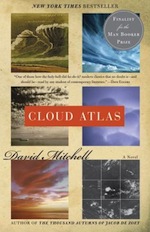 Cloud Atlas by David Mitchell
Cloud Atlas by David Mitchell
In David Mitchell’s masterpiece, six nested stories take us from the South Pacific in the 1800s all the way to a post-apocalyptic future, calling into question the meaning of personal identity and asking if our essence—our souls—live on again and again.
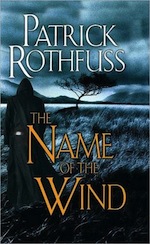 The Name of the Wind by Patrick Rothfuss
The Name of the Wind by Patrick Rothfuss
It might be a stretch to include this book on this particular list, but I was especially affected by the time the hero, Kvothe, spent alone in the woods and then his years as a street urchin. With the traumatic death of his parents, Kvothe loses his place in the world, and with it his identity. He essentially becomes someone else for a very long time, until he recovers enough of who he is to move forward with his life.
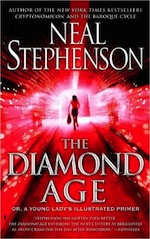 The Diamond Age by Neal Stephenson
The Diamond Age by Neal Stephenson
This is one of my favorite books of all time. It could also be included in a list of “books with tapestries so rich and complicated, no one will ever be able to adapt them into a film.” (No matter what list you put this book on, you should absolutely read it!) In The Diamond Age, Nell slowly grows up and stumbles through identities as she becomes associated with different tribes, or “phyles,” before fully coming into her own and choosing both who she wants to associate with and her own identity by the end of the story.
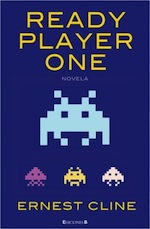 Ready Player One by Ernest Cline
Ready Player One by Ernest Cline
A book entirely wrapped up in false identities. In the year 2045, everyone participates in the OASIS, a virtual reality universe that distracts from the awful conditions of the real world. As readers, we experience most of the story through the online avatars of the characters involved. Here false and true identities are enmeshed in ways that are difficult to separate—or to put it a different way, the false identities are a vital element of the heroes’ own selves.
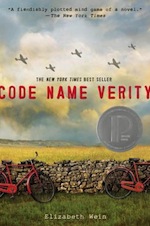 Code Name Verity by Elizabeth Wein
Code Name Verity by Elizabeth Wein
When a spy—a young woman—ends up captured and tortured by the enemy in WWII France, the reader must grapple with the hero’s (or should I say anti-hero’s?) identity. Does she remain true to who she was, or has she sacrificed all of her ideals in order to survive?
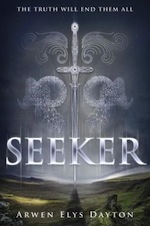 In my novel Seeker, characters also struggle with identity. In the Scotland and Hong Kong of the near future, three teens have spent years undergoing brutal training to become noble Seekers, committed to making the world better and more fair. But the adults they trust most are manipulating them, lying to them. Instead of the noble calling they’ve imagined, they are being turned into terrible people and forced to do very bad things. The story escalates from there…
In my novel Seeker, characters also struggle with identity. In the Scotland and Hong Kong of the near future, three teens have spent years undergoing brutal training to become noble Seekers, committed to making the world better and more fair. But the adults they trust most are manipulating them, lying to them. Instead of the noble calling they’ve imagined, they are being turned into terrible people and forced to do very bad things. The story escalates from there…
Arwen Elys Dayton spends months doing research for her stories. Her explorations have taken her around the world to places like the Great Pyramid at Giza, Hong Kong and its many islands, and lots of ruined castles in Scotland. Arwen lives with her husband and their three children on West Coast of the United States. You can visit follow her on Twitter @arwenelysdayton.










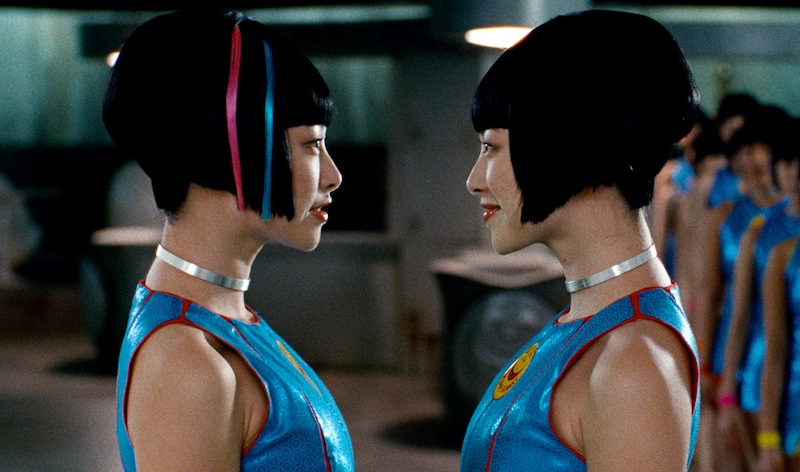
Obliged to mention Hannu Rajaniemi’s Jean le Flambeur series. This is a central theme to The Quantum Thief, The Fractal Prince, and The Causal Angel.
Red Rising by Pierce Brown. Great read, totally should of made the list.
Heinlein’s Double Star — his take on the “actor hired to impersonate the President/King/Supreme Leader” story.
And Terry Pratchett’s Monstrous Regiment where pretty much everyone is pretending to be something they’re not.
The Prisoner of Zenda! Also Sheckley’s Mindswap and much of Philip K. Dick.
Brothers in Arms and Mirror Dance, by Lois McMaster Bujold– a made-to-order clone struggles to get from “copy-of-him” through “anybody-but-him” to a genuine individual sense of self.
Deep Secret, by Diana Wynne Jones– almost everybody has a double identity, some knowingly and some a surprise to themselves as well as to the reader.
Ancillary Justice and Ancillary Mercy, by Ann Leckie– what does “identity” even mean when a consciousness may be replicated in hundreds or thousands of different bodies?
To switch genres, Georgette Heyer’s False Colours is a light-hearted identical-twin farce, with some underlying serious themes about truly recognizing the people you claim to love for who they are.
And, of course, almost any novel by P. G. Wodehouse. Especially any novel set in Blandings Castle, which is famous for having impostors the way other houses have mice.
I’d like to submit, The Opponax Invasion by John Brosnan. A serial conman (of the Robin Hood sort, who only robs evil multi-corps) whose gift is swapping and changing identities is on the run after his last job goes wrong. He’s gone to ground in a new identity, and no one can find him. Which is a pity because right about that time some evil A.I. is poised to take over the world and only a certain conman can stop them. If only they can find him…or her?
http://www.goodreads.com/book/show/1348021.The_Opoponax_Invasion
Plenty of gender politics and identity issues get discussed, as well as some old fashioned sci-fi concepts.
And if you’ll forgive a double post, I forgot to mention Fingersmith, by Sarah Waters. A Victorian-style family drama where you can get dizzy trying to keep up with the family secrets and constantly shifting identities.
@3 More Terry Pratchett.
Going Postal. When Albert Spangler is hanged for defrauding the city his alter ego, Moist Von Lipwig, survives the drop and is recruited by the Patrician to run the failing Post Office. Moist is a man who has always lived behind a series of masks, now he is stripped of them and is beginning to find that Moist Von Lipwig is not the person he always thought he was. Is he a good man who is capable of bad things, or was he always a bad person who is capable of doing good?
There are also some identity issues packed away in Pratchett’s short story “The Sea and Little Fishes”, the novel Witches Abroad, and Pyramids. Actually, as long as you avoid the Rincewind novels, most of the Discworld novels deal with some degree of identity issues or other.
Random22, how about everyone’s favorite interstellar con man, the Stainless Steel Rat? ‘Slippery Jim’ DiGriz and his family swap identities like other people change underwear.
Iain M. Banks’ Use of Weapons obviously.
If you count graphic novels (and why not?), The Private Eye by Vaughan, Marcos and Vincente is a futuristic noir which tries to answer the question: What if the Internet was no more, and we suddenly transferred all our behaviours and customs from the social media into the “real” life? As you might imagine, identities and masks we put on for our and others’ benefit, is a huge theme.
The series has concluded literally just this week, and it’s mind-blowingly good. (It’s also released in pay-what-you-want model, so there is no excuse not to check it out.)
@9 I just can’t into Harry Harrison’s work. It just always came across as far too self-congratulary and smug for me. I’m not talking about the character, whom I accept as intentionally smug, but the whole prose style in its entirety seems to just grate. I acknowledge the influence he had on the genre, but there are better examples out there.
The Lies of Locke Lamora. So many false identities used by the con men here, not to mention the villain.
No love for The Rook? A woman wakes up under an alias and no memories, alias implanted and memories wiped by herself. Oh, and she’s a manager of an occult spy agency with deadly boardroom intrigue.
Written by Daniel O’Malley. I hear there’s a sequel but I haven’t read that yet.
Hari Kunzu’s “The Impressionist” is perhaps one of the most impressive and interesting books about not only false identities, race and identity but also about the fluidity and performativity of identity in general.
It is the story of an Indian boy in the 19th century who is the result of a liason between a high-caste Indian woman and an English officer. When his mother’s husband learns this the boy is kicked out and he assumes a plethora of different identities through necessity and in one instance through a calculated choice when he assumes the identity of a young British scholar. At other times he is forced by circumstance or other people to assume various identities.
It is a well-written and very thought-provoking novel.
“The Separation” by Christopher Priest?
I thought “Kushiel’s Mercy” had an interesting take on this, where the hero volunteers for a new identity under which he’ll entirely forget his true self. It turns him into a complete other, and considering this novel is written from close third person perspective it was quite a narrative gamble but Carey pulled it off.
What about Rachel Aaron’s Eli Monpress books? Eli Monpress is a many things simultaneously, and many of them are false faces.
@16:
And his Prestige, for that matter?
Another which also happens to be one of my favorite books ever “The Face of Another” by Kobo Abe
How about “My Name is Legion” by Roger Zelazny. It’s an anthology about an IT guy who gets a chance to delete his identity from the global computer network. Not, however, before he sets up a series of ‘back doors’ only he knows. He is never named other than by the temporary identities, set up through those back doors, that he uses as a private investigator.
It includes the 1976 Hugo Award winning novella, “Home is the Hangman”. Also a story about the questions of “good”, “evil” and “identity”.